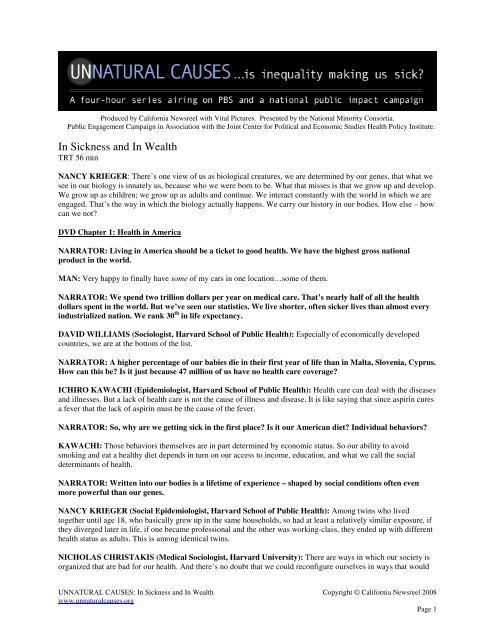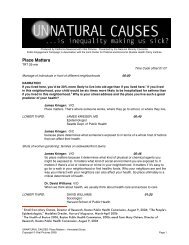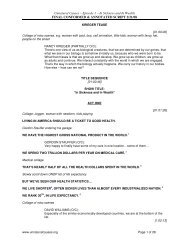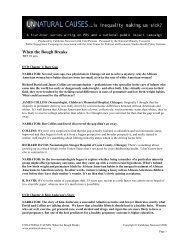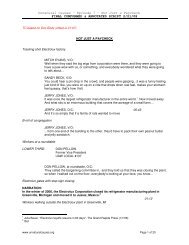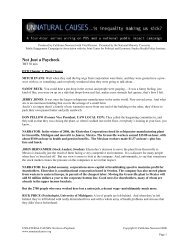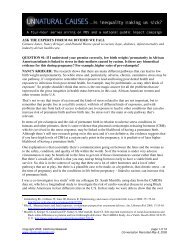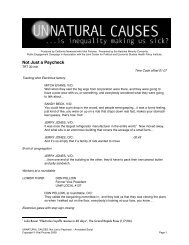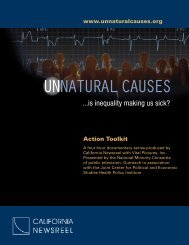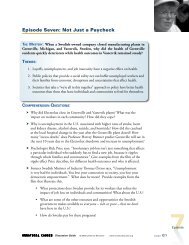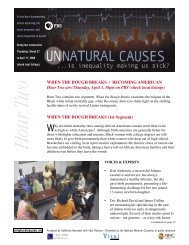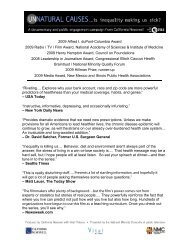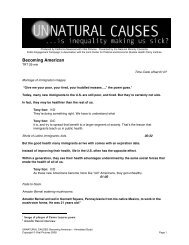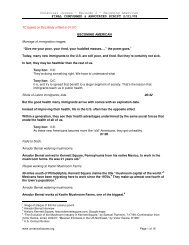In Sickness and In Wealth - Transcript - Unnatural Causes
In Sickness and In Wealth - Transcript - Unnatural Causes
In Sickness and In Wealth - Transcript - Unnatural Causes
Create successful ePaper yourself
Turn your PDF publications into a flip-book with our unique Google optimized e-Paper software.
Produced by California Newsreel with Vital Pictures. Presented by the National Minority Consortia.Public Engagement Campaign in Association with the Joint Center for Political <strong>and</strong> Economic Studies Health Policy <strong>In</strong>stitute.<strong>In</strong> <strong>Sickness</strong> <strong>and</strong> <strong>In</strong> <strong>Wealth</strong>TRT 56 minNANCY KRIEGER: There’s one view of us as biological creatures, we are determined by our genes, that what wesee in our biology is innately us, because who we were born to be. What that misses is that we grow up <strong>and</strong> develop.We grow up as children; we grow up as adults <strong>and</strong> continue. We interact constantly with the world in which we areengaged. That’s the way in which the biology actually happens. We carry our history in our bodies. How else – howcan we not?DVD Chapter 1: Health in AmericaNARRATOR: Living in America should be a ticket to good health. We have the highest gross nationalproduct in the world.MAN: Very happy to finally have some of my cars in one location…some of them.NARRATOR: We spend two trillion dollars per year on medical care. That’s nearly half of all the healthdollars spent in the world. But we’ve seen our statistics. We live shorter, often sicker lives than almost everyindustrialized nation. We rank 30 th in life expectancy.DAVID WILLIAMS (Sociologist, Harvard School of Public Health): Especially of economically developedcountries, we are at the bottom of the list.NARRATOR: A higher percentage of our babies die in their first year of life than in Malta, Slovenia, Cyprus.How can this be? Is it just because 47 million of us have no health care coverage?ICHIRO KAWACHI (Epidemiologist, Harvard School of Public Health): Health care can deal with the diseases<strong>and</strong> illnesses. But a lack of health care is not the cause of illness <strong>and</strong> disease. It is like saying that since aspirin curesa fever that the lack of aspirin must be the cause of the fever.NARRATOR: So, why are we getting sick in the first place? Is it our American diet? <strong>In</strong>dividual behaviors?KAWACHI: Those behaviors themselves are in part determined by economic status. So our ability to avoidsmoking <strong>and</strong> eat a healthy diet depends in turn on our access to income, education, <strong>and</strong> what we call the socialdeterminants of health.NARRATOR: Written into our bodies is a lifetime of experience – shaped by social conditions often evenmore powerful than our genes.NANCY KRIEGER (Social Epidemiologist, Harvard School of Public Health): Among twins who livedtogether until age 18, who basically grew up in the same households, so had at least a relatively similar exposure, ifthey diverged later in life, if one became professional <strong>and</strong> the other was working-class, they ended up with differenthealth status as adults. This is among identical twins.NICHOLAS CHRISTAKIS (Medical Sociologist, Harvard University): There are ways in which our society isorganized that are bad for our health. And there’s no doubt that we could reconfigure ourselves in ways that wouldUNNATURAL CAUSES: <strong>In</strong> <strong>Sickness</strong> <strong>and</strong> <strong>In</strong> <strong>Wealth</strong> Copyright © California Newsreel 2008www.unnaturalcauses.orgPage 1
TROUTMAN: … <strong>and</strong> the further east you get the more affluent the communities become.NARRATOR: Furthest east <strong>and</strong> north is Council District 16, home to Jim Taylor. Taylor is a father,gr<strong>and</strong>father, <strong>and</strong> a CEO.TAYLOR FAMILY MEMBER: So is this going to be like when your Board chairman came <strong>and</strong> the grill didn’twork?JIM TAYLOR: I like to think of myself as a pretty healthy person. I’m only 12 months away from the 60 th year ofmy existence <strong>and</strong> I feel pretty healthy. I can’t do the things I did when I was 20 now that I’m almost 60, but I can domost of them in a little moderation (laughs).JIM TAYLOR (to gr<strong>and</strong>son): Is James gonna be here too? I like James…NARRATOR: Like many residents here, Taylor earns well into the six figures. His income places him in thetop 1% of Americans. The wealth of that 1% is greater than that of the bottom 90% combined.JIM TAYLOR: We’re fortunate that the choices we have may be greater than people who have less means than wedo. I have a neighborhood where I can be outside <strong>and</strong> know that I’m safe <strong>and</strong> that I can exercise <strong>and</strong> walk. And Iknow that not every neighborhood in this country or in this city, that’s true.DVD Chapter 3: Jim Taylor / WhitehallNARRATOR: Excess death doesn’t seem to be a health issue in council district 16. Here life expectancy isnearly 80 years – two years longer than the national average.NICHOLAS CHRISTAKIS: Most people can quite readily appreciate the fact that if you have more money you’regoing to be healthier. But it also turns out that that observation holds not just at the extremes. So, for example, let’ssay that there’s a ladder. It’s not just that the rich differ in some way from the poor in some kind of black-white oryes-no or zero-one kind of way. There’s a fine gradation all the way along this ladder, both in wealth <strong>and</strong> in health.NARRATOR: Researchers had wondered about this for decades. But in the 1970s, the pioneering WhitehallStudies offered hard data. Sir Michael Marmot has been lead researcher.SIR MICHAEL MARMOT (Epidemiologist, University College London): I was interested in how socialinfluences affect disease. And so we looked at people’s grade in the hierarchy, their employment grade.NARRATOR: Over more than thirty years, Marmot <strong>and</strong> his team charted the health of 29,000 British civilservants.MARMOT: When we did this in the 1970s, the conventional wisdom was that it was the business executive whohad a high rate of heart attacks. And what we found in Whitehall was the lower the grade of employment, the higherthe risk of heart disease. But not just heart disease – every major cause of death. So if you were second from the top,you had worse health than if you were at the top; if you were third from the top, you had worse health than if youwere second from the top ---- all the way from top to bottom.NARRATOR: <strong>In</strong> Britain everyone has guaranteed health care. Still, Marmot found that death rates <strong>and</strong>illness correlated to status, even after he controlled for unhealthy behaviors.MARMOT: A combination of smoking, blood pressure, cholesterol, overweight, sedentary life style explained nomore than about a quarter of the social gradient in mortality. So heart disease among smokers, if a poor person’ssmoking, he or she has a higher rate of disease than if a wealthy person is smoking.Then a “classless” country like the United States said we wouldn’t find that here, because we don’t have socialUNNATURAL CAUSES: <strong>In</strong> <strong>Sickness</strong> <strong>and</strong> <strong>In</strong> <strong>Wealth</strong> Copyright © California Newsreel 2008www.unnaturalcauses.orgPage 3
classes like they do in Britain. And of course once people started to look at the United States, they found socialgradients in disease of the same order as those we found in Britain.NARRATOR: <strong>In</strong> America, the wealth health gradient looks like this: Over 70% of affluent American reportvery good to excellent health – almost twice as many as poor Americans. No surprise. But in the middle levels,good health decreases significantly. This translates into a reverse slope for chronic disease. Diabetes: LowincomeAmericans have twice the rate of disease as the affluent. And for those in the middle, it’s still almosttwice the rate. A similar pattern holds for stroke, heart disease, eventually contributing to excess death,especially for middle <strong>and</strong> low income Americans.MARMOT: The conditions that show up in stark form in the poor health of the poor are showing up in somewhatless stark form in people who we don’t think of as poor. The large mass in the middle of society are also beingaffected. We find these social gradients in health everywhere.TROUTMAN: When I first came to Louisville I was struck by how different the various communities look. And Ibegan to wonder <strong>and</strong> then underst<strong>and</strong> that there’s a direct connection between the health of the population inLouisville <strong>and</strong> the social conditions that can be seen as you go from one council district to another.DVD Chapter 4: Gradient / Tondra YoungNARRATOR: South of Jim Taylor’s home is Council District 24. Tondra Young lives here. Young is 37, a labsupervisor – <strong>and</strong> she’s just gotten engaged.TONDRA YOUNG: Financially, I’m comfortable. I’d like to be rich someday, but right now I’m fine. I’m doing awhole lot better than my mom was. Just bought a new home. And I would describe my family as a middle classfamily now, yeah, I would.NARRATOR: To get ahead, Tondra went back to college while working full time.TONDRA YOUNG: I am going to graduate in the spring; I’m very excited about that. I’ve traveled a long ways toeven get to that point.NARRATOR: Research shows that college graduates live on average two <strong>and</strong> a half years longer than highschool graduates.TROUTMAN: Education offers a way to move up the wealth gradient, it connects to the type of job; it connects tooptimism about the future. But getting it depends on whether you can afford it.NARRATOR: Tondra’s degree has left her $20,000 in debt, on top of her mortgage. <strong>In</strong> the last five years, thecost of college has increased 35%. Only 15% of adults in Tondra’s council district have a college education,compared with over 63% in Jim Taylor’s district. Life expectancy here is 75 years, four years less than in JimTaylor’s.DVD Chapter 5: Corey AndersonNARRATOR: Northwest from Tondra Young’s district is Council District 21. This is where Corey Andersonlives with his wife Angelique <strong>and</strong> their two teenagers. Corey’s lived in this part of town all his life.COREY ANDERSON: This is my mother. This is the woman who taught me how to iron my clothes – put mycreases in, get the wrinkles out. I give her all her due praise <strong>and</strong> the glory for teaching me how to keep myself nice<strong>and</strong> neat.NARRATOR: When Corey was young, his mom worked full time. And her job was more than just aUNNATURAL CAUSES: <strong>In</strong> <strong>Sickness</strong> <strong>and</strong> <strong>In</strong> <strong>Wealth</strong> Copyright © California Newsreel 2008www.unnaturalcauses.orgPage 4
paycheck.COREY ANDERSON: She had just purchased the house, everything was great for me – I’m doing good, youknow, I’m being blessed. Then all of a sudden the company moved. It took a major toll on her when she lost herjob. She got ill, her blood pressure went up, y’know, <strong>and</strong> had to go to the doctor more often. It was just somethingthat really took a toll on her, y’know, mentally <strong>and</strong> physically. As well as me <strong>and</strong> my brother.NARRATOR: Eventually Corey’s mom did find work, but she had to leave her home. For most Americans,home ownership is a way to build financial security.ANGELIQUE ANDERSON: I always wanted to have a house with a big back yard, with a fence, <strong>and</strong> my kidscould run around, have their own room. A basement.COREY ANDERSON: A basement, with a pool table… I want to own a house. I want to own a house so that ifanything happened to me, she wouldn’t be put out on the street.NARRATOR: Corey <strong>and</strong> Angelique both work full time. Their combined salaries place them right at thenational median income: about $48,000. Half of all American households live at this income level or below.COREY ANDERSON: As far as, like, saving, we don’t earn enough to say we’re going to put away $250 <strong>and</strong> don’ttouch it …ANGELIQUE ANDERSON: It’s going to have to take to work two jobs to really make it.COREY ANDERSON: You ain’t working two jobs.ANGELIQUE ANDERSON: I didn’t say me!NARRATOR: At 37, Corey has already been diagnosed with hypertension, joining one third of the resident inCouncil District 21. Average life expectancy here is two years shorter than in Tondra’s council district – sixyears less than in Jim Taylor’s. Troutman sees social conditions change even more markedly as he drivesthrough Louisville city center, across Ninth Street.TROUTMAN: There’s almost a cultural demarcation in the city where on one side of this particular street, NinthStreet, there’s a tremendous amount of new development going on, condos rising up. The downtown businessenvironment is very much alive. And right across the street on Ninth Street, is where the beginnings of the first setof projects are, public housing projects.Very little business in this area, primarily fast foods, small business, barbershops, beauty salons, pawn brokers, nailparlors, check cashing, liquor stores. ‘Payday Cash, Cash when it counts.’ And it seems like every city has a NinthStreet. Whether it’s 110 th Street in Harlem or South Side of Chicago. Or sections of Watts…ANA DIEZ ROUX (Epidemiologist, University of Michigan): Of course these differences are not a natural thing.It’s not the design of nature that these environments are going to be different. They arise as a result of policies orthe absence of policies that create these enormous inequalities <strong>and</strong> resources.TROUTMAN: Is there adequate access to chain supermarkets in this area? The answer is no. As a matter of fact,why aren’t there zoning laws to regulate fast food outlets here? Enterprise zones to build businesses? Bettertransportation? Why isn’t there more mixed income housing? You know, all these things <strong>and</strong> others are healthpolicy.DVD Chapter 6: Mary TurnerNARRATOR: How social policies can drive health becomes even more apparent in Council District 5, theUNNATURAL CAUSES: <strong>In</strong> <strong>Sickness</strong> <strong>and</strong> <strong>In</strong> <strong>Wealth</strong> Copyright © California Newsreel 2008www.unnaturalcauses.orgPage 5
home of Mary Turner.MARY TURNER: This is where we usually come down for shoes, school shoes <strong>and</strong> school clothes… Up here isSave-A-Lot…NARRATOR: A third of the residents here have never received a high school diploma. Almost 30% live at orbelow the poverty line, like Mary. Life expectancy in Mary’s council district is more than three years lessthan in Corey’s district, nine years less than in Jim Taylor’s.MARY TURNER: Of course we’re dying young, versus 80 in the eastern section of the county. Y’know, becausethose people are more affluent, <strong>and</strong> they have things open to them.NARRATOR: Mary is 49, with three children at home. Her husb<strong>and</strong> is disabled.MARY TURNER: You have to eat what fits your budget. So when you get these, a family size, <strong>and</strong> they’re a dollar99, <strong>and</strong> you can feed four people with it, y’know, versus maybe four with four dollars, I mean, what’s your choicegoing to be? Especially on a $200 a month budget for food. Food that we buy would last about 2 weeks. We spendcash for part of the month, when we get SS <strong>and</strong> SSR. We spend about $125-175 a month for groceries if not more.About the end of the month, things get real spare. Y’know, I got 3 teenagers, so about the end of the month I’mreducing to one meal a day, so I make sure the kids got everything they need.NARRATOR: 12% of the residents here are unemployed – more than double the national average. As isMary for now, so she volunteers at the neighborhood museum she loves.MARY TURNER: I do feel things are out of control sometimes. Because as soon as you try to better yourself… IfI even get a job, you know, then I might lose my medical coverage, <strong>and</strong> my medical coverage is necessary. Youknow, because I have to have my medications in order to work. I had a heart attack several years ago. It was mild,but it was still a heart attack. Thyroid problems, you know. And arthritis, you know, a little bit of everything.TONY ITON (Director, Alameda County, CA Public Health Dept.): We can predict on aggregate, based onwhere somebody lives, high school graduation rates, <strong>and</strong> their income, how long they will live <strong>and</strong> when they willdie. Now, obviously there’ll be exceptions to that, but for the most part we’ll be right. And we should not be able todo that. Your life expectancy, how long you will live, should not be dependent on, essentially, the resources youhave accessible to you.DVD Chapter 7: Biology of StressS. LEONARD SYME (Epidemiologist, UC Berkeley): We know that social class is the most importantdeterminant of health above any other risk factor. But what does social class mean? Is it housing, or medical care?Education?NARRATOR: Or is it power? Confidence? A sense of security?SYME: Which one of those is most important? Hopeless, they’re all inextricably intertwined, can’t take them apart.So it’s really a challenge.NARRATOR: But how do we carry social class in our bodies? How does it get under our skin?SYME: As you go through the alternative explanations, the one that seemed most impressive to me was this idea ofcontrol of destiny. I don’t like that word. What I mean by it is the ability to influence the events that impinge onyour life, even if it means not doing anything, but one way or the other, managing those pressures.MICHAEL MARMOT: There’re all sorts of ways we’ve devised for depriving people of a sense of control overtheir lives. Living in a community where it’s not safe to go out.UNNATURAL CAUSES: <strong>In</strong> <strong>Sickness</strong> <strong>and</strong> <strong>In</strong> <strong>Wealth</strong> Copyright © California Newsreel 2008www.unnaturalcauses.orgPage 6
the control that it needs to create an optimal environment for himself. <strong>In</strong> contrast, subordinate animals have almostno control over what happens to them. They have to be watching all the time. With that high-level vigilance comesincreases in heart rate.NARRATOR: Macaques with less power <strong>and</strong> control are in a state of chronic stress. The evidence is in theirstress hormone levels.SHIVELY: They have higher levels of cortisol circulating in their blood. It’s the same chemical that is released inhuman beings in response to stress. And when it is sustained at high levels it starts having negative effects oncellular function <strong>and</strong> tissues.NARRATOR: Shively can actually look into the hearts of macaques to see the damage from chronic stress.SHIVELY: This is a cross-section of the artery of a dominant monkey. The hole in the center is large <strong>and</strong> thatmeans that there’s lots of room for blood to flow through. This is the artery of a subordinate animal. So what’shappened here is that a subordinate monkey has developed a much larger atherosclerotic plaque than a dominantanimal, who lived for the same amount of time, ate the same amount of diet <strong>and</strong> so on <strong>and</strong> so forth. And that issimply due to the stress of social subordination. Now, if this monkey keeps developing atherosclerosis at thisincreased rate relative to this monkey, this one is going to end up with an artery that is completely compromised <strong>and</strong>have a myocardial infarction.NARRATOR: <strong>In</strong> other words, a heart attack. Monkey are one thing, humans another. Do we see a similarpattern? That’s what psychologist Sheldon Cohen wanted to know. He used the same stress measure Shivelyused, levels of cortisol.RESEARCHER: Who’s next?SHELDON COHEN (Psychologist, Carnegie Mellon University): We have people chew on little cotton swabstill they get wet. And take it <strong>and</strong> analyze it for cortisol.NARRATOR: He compared their levels with their socio-economic status.COHEN: And to tell you the truth, I’m always somewhat surprised when I see these data. It turns out the moreeducation you have, the less cortisol you release during the day. The more income you have, the less cortisol yourelease during the day.NARRATOR: Then Cohen wanted to test the effect of stress on our bodies. His focus: our immune system.COHEN: Basically we brought healthy people in <strong>and</strong> we exposed them to a virus. We actually do this by putting adrop in their nostrils that has a cold virus in it.NARRATOR: Cohen’s finding? Those with less chronic stress caught fewer colds than those with morestress. While a cold virus may seem minor, it could signal more serious health problems.COHEN: The cold study is a paradigm we can use that allows us to see how effectively the immune system isoperating, which has implications for not only colds <strong>and</strong> other infectious diseases, but autoimmune diseases <strong>and</strong>some kinds of cancers.DVD Chapter 10: Dem<strong>and</strong>s & ControlNARRATOR: So… higher status, less stress. Less stress, better immune function.JIM TAYLOR: You still like this place compared to where you were before?UNNATURAL CAUSES: <strong>In</strong> <strong>Sickness</strong> <strong>and</strong> <strong>In</strong> <strong>Wealth</strong> Copyright © California Newsreel 2008www.unnaturalcauses.orgPage 8
NARRATOR: Being a CEO is a high dem<strong>and</strong> job, but Taylor usually has the power, resources <strong>and</strong> control tomanage that pressure. Tondra Young has a high dem<strong>and</strong> job, but less power <strong>and</strong> control.TONDRA YOUNG: Sometimes it can get a little stressful, because I have 50-something employees running aroundon three different shifts in different buildings. Sometimes it can be tough for me, ‘cause they might not like thedecisions that I’ve made for the department, but I’m making the best decisions for the department <strong>and</strong> for patientcare.COREY’S MANAGER: Looking good in here…COREY ANDERSON: The control that I have on my job is limited.NARRATOR: Corey Anderson’s job requires him to respond to a lot of dem<strong>and</strong>s from above.COREY ANDERSON (on the phone): Mission complete on the first floor; I want to know what my next projectis.NARRATOR: <strong>In</strong> one scenario, Corey is first told to clean patient rooms.COREY ANDERSON: But I got pulled to help out with trash. So I started on the trash <strong>and</strong> when I pull the trash, Igot a page to tell me to go back to the rooms. I was bounced around.Corey (on the phone): You want these scrubbed?NARRATOR: Like Corey, one in every five American men works in a high dem<strong>and</strong>/ low control job. They’remore likely to experience high blood pressure at work. And, their blood pressure doesn’t fall as much as menwith more control – even when they sleep.MICHAEL MARMOT: It’s not only about work. It’s about where you are in the hierarchy, <strong>and</strong> how that relates tothe circumstances in which you live, grow up, as well as work.COREY ANDERSON: So this is basically what I call my neighborhood. I don’t venture no farther, because I’mnot comfortable with venturing back there, <strong>and</strong> back over that way. A lot of things do occur back in the back. Andmy wife she knew a cab driver who was murdered back there in the back.ANGELIQUE ANDERSON: Two cab drivers, one got shot in the head. The other one got shot <strong>and</strong> they droppedhim off in his yard. Remember that, Corey? Right over here on Kingston?COREY ANDERSON: I thought he got strangled.ANGELIQUE ANDERSON: Oh yeah, they strangled him. And then they shot another young boy…NARRATOR: The accumulation of stressors, or the accumulation of resources to manage them. So much isdetermined by class.JIM TAYLOR: I’m well paid for what I do. I’m fortunate enough to be able to have a choice of where we live.More than half the mornings when I come to work, I have to stop for deer to go by, <strong>and</strong> that kind of thing is justwhat happens in this neighborhood. We have the time to exercise, because the lives we live don’t require us to try tofind a bus that we have to ride for two hours to get to our job.And on the other end, we don’t have huge dem<strong>and</strong>s on us when we’re not working. Jackie <strong>and</strong> I talked a lot abouthealthy choices of eating. Well, that doesn’t come for free. We have the ability to get to places, where one can makethose choices. We have the time to prepare the meal that we had the money to buy.NARRATOR: So a certain economic status brings you control over other parts of your life… the kinds ofUNNATURAL CAUSES: <strong>In</strong> <strong>Sickness</strong> <strong>and</strong> <strong>In</strong> <strong>Wealth</strong> Copyright © California Newsreel 2008www.unnaturalcauses.orgPage 9
The 1950’s. The middle class was growing. <strong>In</strong>come inequality was declining. Prosperity <strong>and</strong> medical advancesextended our lives even longer.NICHOLAS CHRISTAKIS: But the vast majority of improvements in health in our society over the last centuryhave had very little to do with medical innovation. What really counts is other kinds of things we can do, <strong>and</strong> thoseother kinds of things tend to be non-medical things. Like, thinking about the distribution of wealth in our society, orproviding public health infrastructure, or better education for people, better housing – all of those things whicharen’t medical phenomena. It’s all those that are really material for public health.SPEAKER AT CIVIL RIGHTS MARCH: Black <strong>and</strong> white together…NARRATOR: <strong>In</strong> the 1960’s, civil rights laws, anti-poverty programs, Medicare, Medicaid… all brought thebenefits of prosperity to those who hadn’t yet shared in it.DVD Chapter 13: <strong>Wealth</strong> GapDAVID WILLIAMS: During the 1960s to early ‘70s, the black-white gap in income narrowed <strong>and</strong> the black-whitegap on multiple indicators of health also narrowed. What this says very eloquently is that economic policy is ahealth policy. And when we improve economic circumstances <strong>and</strong> narrow the economic gap we improve the health.CHRISTAKIS: So we can potentially intervene or potentially see a world in which while we do not eliminatehierarchy, we constrain the way in which hierarchy affects human beings. So it’s not just that the people at the topcan afford those things <strong>and</strong> get them, <strong>and</strong> those at the bottom that can’t do not, if we provide them to all, we stillhave some hierarchy, but now we’ve kind of reduced the disparities.NARRATOR: But since the 1980’s, we’ve gone in the opposite direction.MAN IN 1980’S UNEMPLOYMENT LINE: I used to work for these people, now I gotta st<strong>and</strong> in line to get a boxof cheese.1980’S MAN #2: Waiting for the Reagon trickle-down, <strong>and</strong> it’s not trickling.NARRATOR: <strong>In</strong> the midst of a recession, government slashed social programs, deregulated industry,reduced taxes for the wealthy… with consequences that remain with us today.WARREN BUFFETT (at Senate Finance Committee Hearing, Nov. 14, 2007): <strong>In</strong> a country that prides itself onequality of opportunity, it is becoming anything but that as the gap between the super rich <strong>and</strong> the middle widens indramatic fashion.NARRATOR: Warren Buffett, the world’s third richest man…WARREN BUFFETT: Here are a few figures on the Forbes 400. Other people save their Playboy magazines; Isave the Forbes 400 magazine. Twenty years ago, the total wealth of the list was then $220 billion. Now it’s $1.54trillion, exactly a seven for one increase. Tax law changes have benefited this group, including me, in a huge way.NARRATOR: <strong>Wealth</strong> inequality reached a record low in 1976. Since then it has soared. Today, we are far<strong>and</strong> away the most unequal of the world’s rich democracies.WARREN BUFFETT: During that same period, the average American went exactly nowhere on the economicfront. He’s been on a treadmill while the super rich have been on a spaceship.WILLIAMS: The poor are getting poorer <strong>and</strong> the middle class is getting squeezed. With what we know in terms ofhealth, that suggests that we will have even more health problems in the future.UNNATURAL CAUSES: <strong>In</strong> <strong>Sickness</strong> <strong>and</strong> <strong>In</strong> <strong>Wealth</strong> Copyright © California Newsreel 2008www.unnaturalcauses.orgPage 12
NARRATOR: That’s because here, health depends largely on our individual assets <strong>and</strong> resources.TONY ITON: <strong>In</strong> America, it’s the strongest relationship you’ll find anywhere, that wealth pretty muchequals health. And that’s true for me as it is true for you know the poorest person in the quote-unquote innercity, <strong>and</strong> people living in the suburbs.DVD Chapter 14: Other CountriesNARRATOR: The wealth-health gradient is not as steep in most other industrialized nations. Many use theirresources to ensure that more of their citizens have the freedom to lead flourishing healthy lives. Allguarantee universal health care coverage, m<strong>and</strong>ate at least four weeks of paid vacation. France’s minimumwage has been twice as much as ours. Irel<strong>and</strong> provides free college education. Sweden’s family policies reducechild poverty to a mere 4.2% compared to our 21%.JACK SHONKOFF: It’s tragic actually that we are the richest country in the world <strong>and</strong> that we are far behindmany other countries in terms of how we use our resources to make life better for families with young children, <strong>and</strong>thereby invest in our future.ITON: Those countries have found ways to break the tight linkage between income <strong>and</strong> wealth <strong>and</strong> health. And theyinvest in better education systems, housing support, childcare, access to recreation. They subsidize through taxpolicy, mechanisms that break that strong relationship. Those countries where wealth is more equitably distributedare healthier.DVD Chapter 15: Community <strong>In</strong>itiativesNARRATOR: Here in the U.S., many communities are taking health matters into their own h<strong>and</strong>s.ADAWALE TROUTMAN: I’m glad you’re here. I’m excited that you’re here because this is the mosaic ofpeople, partnerships, organizations, agencies that we need to come together to make this a reality.NARRATOR: <strong>In</strong> Louisville, the city’s new Health Equity Center trains citizens to take political action <strong>and</strong>design policies that address the health needs of their community.TROUTMAN: It’s not enough to talk about individual behavior <strong>and</strong> feel that if we could just get people to exercisemore <strong>and</strong> eat more fruits <strong>and</strong> vegetables everything would be all right. That is not the case. The bigger issues arethe social conditions that drive the ultimate health status of populations.NARRATOR: <strong>In</strong> Seattle, Washington, community activists target unhealthy housing – <strong>and</strong> the asthma thatkeeps many from leading productive lives.TIM TAKARO: The air is inside the home is actually healthier than the air outside.TROUTMAN: Part of good public health is empowering communities. And I don’t think we should shy away fromthat. And empowering communities means creating those conditions where people become empowered <strong>and</strong> makethe changes they need to control their lives. Power is a public health issue.TERROL DEW JOHNSON: And here’s my gr<strong>and</strong>pa. He died of diabetes, diabetes <strong>and</strong> the complications ofdiabetes…NARRATOR: <strong>In</strong> Arizona, Native Americans are farming again. With better food <strong>and</strong> new economicresources, they are beginning to take control of their destinies – <strong>and</strong> diabetes.UNNATURAL CAUSES: <strong>In</strong> <strong>Sickness</strong> <strong>and</strong> <strong>In</strong> <strong>Wealth</strong> Copyright © California Newsreel 2008www.unnaturalcauses.orgPage 13
TROUTMAN: Of course the proof is in the pudding. The proof is in the next steps: what we can organize, what wecan implement, <strong>and</strong> how we’re able to move this community ahead. It’s about human rights. It’s about addressingthe social determinants of health in order to make a difference. It’s about fairness. It’s about health equity <strong>and</strong> socialjustice.MICHAEL MARMOT: We’ve got to create a movement where people underst<strong>and</strong> we’re talking about leadingmore flourishing lives. We need to do certain things ‘cause they’re the right things to do. But it’s an issue ofindividual self-interest. If I live in a just society, I’ll benefit.TONY ITON: An economist will tell you it’s inefficient to have people who could otherwise be contributing duringtheir productive years to the overall benefit of society caught up in hospitals that create a net dependence on society,so they’re drawing resources down from society rather than producing resources that benefit the society as a whole.NARRATOR: And the cost of that lost productivity to business due to chronic illness is staggering. It’s nowestimated at over one trillion dollars a year. Worse, one study predicts that today’s generation of youngAmericans may be the first in a century to live shorter lives than their parents.TROUTMAN: And I would hope that we would all be able to-to gravitate towards an egalitarian society wherehealth is seen as a basic human right.TROUTMAN (to kids): Somebody told me this table had the fastest kids in all of Louisville – is that true?TROUTMAN: But even if you’re not willing to go that far, you’d better be involved in this, because self-interestwould dictate that you’re at risk too.ITON: We can wait for things to happen <strong>and</strong> try to repair them in this mode of damage control. Or we can investearly, try to set good trajectories for families <strong>and</strong> children in communities…. We can do those things. Or we canengage in damage control. We have a choice.ENDUNNATURAL CAUSES: <strong>In</strong> <strong>Sickness</strong> <strong>and</strong> <strong>In</strong> <strong>Wealth</strong> Copyright © California Newsreel 2008www.unnaturalcauses.orgPage 14


